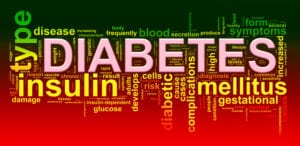Written by Chrystal Moulton, Staff Writer. Researchers found that berberine plus probiotics was most effective in lowering postprandial LDL-C (p= 0.04) and total cholesterol (p= 0.001).
 Diabetes mellitus is a metabolic disorder characterized by elevated blood glucose levels and altered metabolism of carbohydrates, fats, and proteins due to defects in insulin secretion 1. The prevalence of diabetes continues to increase globally and is expected to affect 10.9% of the population by 2045 2.
Diabetes mellitus is a metabolic disorder characterized by elevated blood glucose levels and altered metabolism of carbohydrates, fats, and proteins due to defects in insulin secretion 1. The prevalence of diabetes continues to increase globally and is expected to affect 10.9% of the population by 2045 2.
Berberine, an isoquinoline alkaloid, has been studied for its ability to improve insulin resistance and regulate elevated blood glucose and lipid levels 3. In addition, probiotic supplementation, along with berberine, has been shown to improve metabolic disorders through its glucose control and ability to regulate the intestinal environment to achieve an improved hypoglycemic effect 4.
In a placebo controlled multi-center clinical trial, postprandial blood samples in patients from the PREMOTE trial (probiotics and berberine on the efficacy and change of gut microbiota in patients with newly diagnosed type 2 diabetes trial) were examined to evaluate the effect of probiotics with or without concomitant berberine supplementation on lipid profile versus placebo 5.
The PREMOTE study 6 was a placebo-controlled, randomized, double-blind clinical trial. The study lasted 3 months and recruitment targeted newly diagnosed type 2 diabetes patients. The primary outcome evaluated was glycemic control and the secondary outcome was lipidemic control. Patients were randomly assigned to one of four groups in a 1:1:1:1 ratio:
- Placebo
- Placebo plus berberine (BBR)
- Berberine (0.6g/6pills)
- Twice daily before meals
- Placebo plus probiotics (Prob)
- Probiotic (4g per 2 sachets of powder)
- Once daily at bedtime
- Berberine plus probiotics (Prob+BBR)
- Berberine
- 0.6g/6pills
- Twice daily before meals
- Probiotic
- 4g per 2 sachets of powder
- Once daily at bedtime
- Berberine
In the initial PREMOTE trial 6, 409 patients completed the study. Of the 409 patients who completed the initial study, data from 365 patients were assessed in this study based on the availability of postprandial measurements. In the initial trial also, postprandial blood samples were taken 2 hours after a standard 100g carbohydrate meal provided to the patients. The samples were used to measure LDL-C, HDL-C, triglycerides, and total cholesterol. In the initial trial, berberine and probiotics plus berberine demonstrated similar effects in improving fasting lipid levels. In this secondary assessment, researchers analyzed the data once again to determine which of the above protocols was most effective in improving postprandial lipid levels.
Participants were randomly assigned to each group as follows: 91 in the placebo, 92 in probiotic group, 84 in the berberine group, and 98 in the berberine plus placebo group. No significant differences were observed between the groups at baseline. At the end of the trial, researchers found that berberine plus probiotics was most effective in lowering postprandial LDL-C (p= 0.04) and total cholesterol (p= 0.001). Both berberine and berberine plus probiotics was effective in lowering triglycerides (p= 0.037 and p= 0.035, respectively). No significant effect was found on HDL-C in any of the groups. Further analysis also showed that berberine plus probiotic treatment significantly altered 31 lipid metabolites; twenty of which significantly contributed to the post-treatment outcomes. Genomic analysis also found that berberine and Bifidobacterium breve had a synergistic effect in improving postprandial lipid profile.
This secondary analysis of the PREMOTE trial data revealed that berberine plus probiotics were effective in improving postprandial lipid by altering lipid metabolites (thus decreasing intestinal lipid uptake). Limitations of the study include the predesigned nature of the study and its inability to assess long-term efficacy on major adverse cardiovascular events in the combined treatment of probiotics and berberine. Further studies will be needed to assess the effectiveness of other probiotic strains in combination with berberine on postprandial dyslipidemia.
Source: Wang, Shujie, Huahui Ren, Huanzi Zhong, Xinjie Zhao, Changkun Li, Jing Ma, Xuejiang Gu et al. “Combined berberine and probiotic treatment as an effective regimen for improving postprandial hyperlipidemia in type 2 diabetes patients: a double blinded placebo controlled randomized study.” Gut microbes 14, no. 1 (2022): 2003176.
© 2021 The Author(s). Published with license by Taylor & Francis Group, LLC.
Click here to read the full text study.
Posted June 10, 2022.
Chrystal Moulton BA, PMP, is a 2008 graduate of the University of Illinois at Chicago. She graduated with a bachelor’s in psychology with a focus on premedical studies and is a licensed project manager. She currently resides in Indianapolis, IN.
References:
- Masiero S, Alberti A, Corbella S, Francetti L. Chairside Screening for Undiagnosed Diabetes and Prediabetes in Patients with Periodontitis. Int J Dent. 2022;2022:9120115. doi:10.1155/2022/9120115
- Omar SM, Musa IR, Idrees MB, Abdelbagi O, Adam I. Prevalence and associated factors of erectile dysfunction in men with type 2 diabetes mellitus in eastern Sudan. BMC Endocr Disord. May 28 2022;22(1):141. doi:10.1186/s12902-022-01060-0
- He Q, Chen B, Wang G, et al. Co-Crystal of Rosiglitazone With Berberine Ameliorates Hyperglycemia and Insulin Resistance Through the PI3K/AKT/TXNIP Pathway In Vivo and In Vitro. Front Pharmacol. 2022;13:842879. doi:10.3389/fphar.2022.842879
- Ming J, Yu X, Xu X, et al. Effectiveness and safety of Bifidobacterium and berberine in human hyperglycemia and their regulatory effect on the gut microbiota: a multi-center, double-blind, randomized, parallel-controlled study. Genome Med. Aug 9 2021;13(1):125. doi:10.1186/s13073-021-00942-7
- Wang S, Ren H, Zhong H, et al. Combined berberine and probiotic treatment as an effective regimen for improving postprandial hyperlipidemia in type 2 diabetes patients: a double blinded placebo controlled randomized study. Gut Microbes. Jan-Dec 2022;14(1):2003176. doi:10.1080/19490976.2021.2003176
- Zhang Y, Gu Y, Ren H, et al. Gut microbiome-related effects of berberine and probiotics on type 2 diabetes (the PREMOTE study). Nat Commun. Oct 6 2020;11(1):5015. doi:10.1038/s41467-020-18414-8
